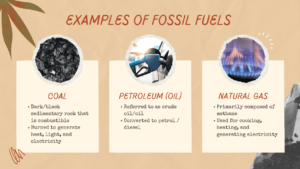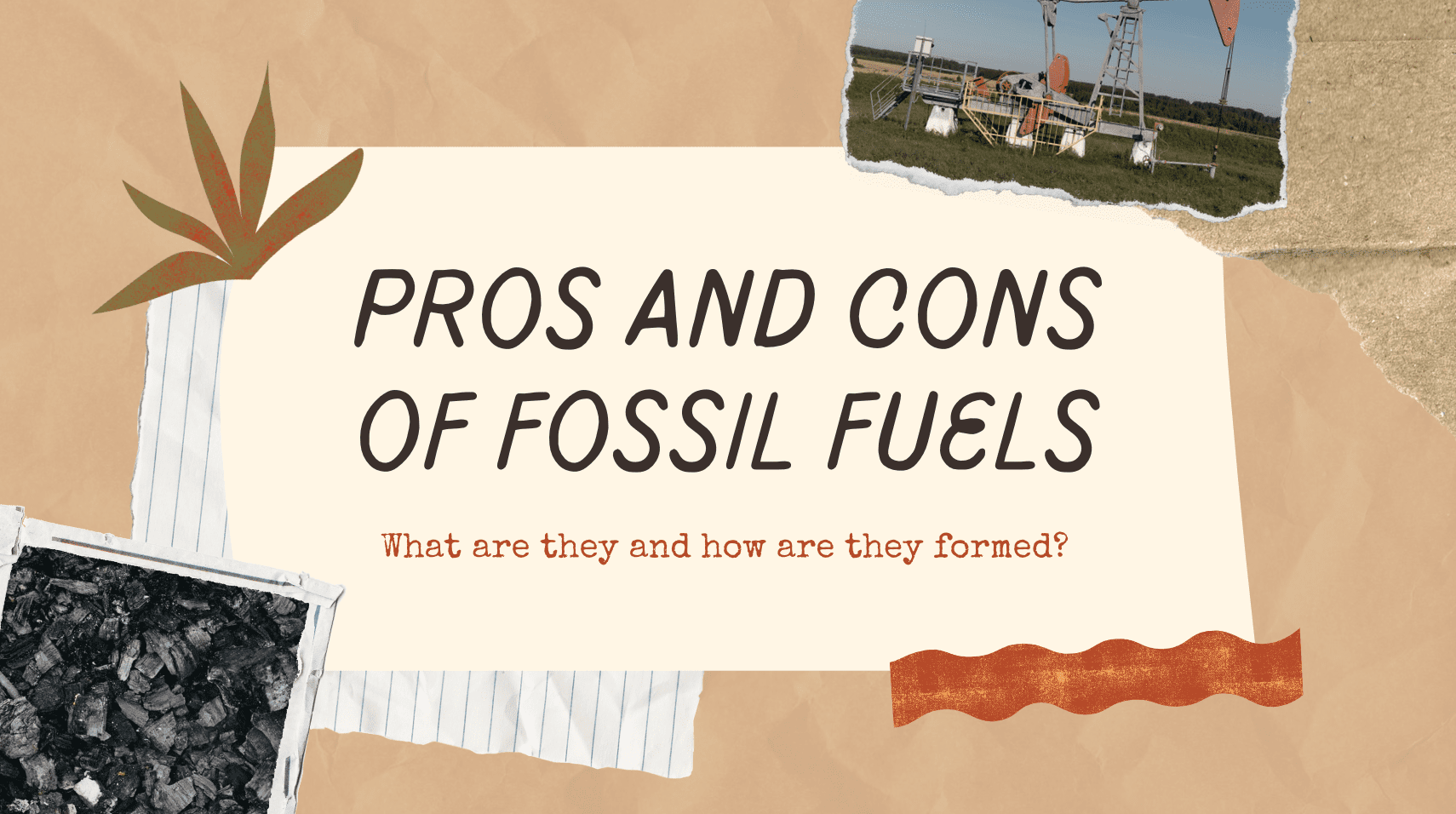Fossil fuels, the mainstay of global energy, have been powering our world for centuries. This article provides a thorough examination of the various types of fossil fuels and their respective advantages and disadvantages, offering crucial insights for an informed perspective in today’s energy landscape.
What Are Fossil Fuels?
Fossil fuels are energy sources formed from the decomposed remains of ancient plants and animals, comprising primarily of coal, oil, and natural gas. These fuels have been pivotal in driving the industrial revolution and shaping the modern technological landscape.
The formation of fossil fuels is a million-year-long process. It involves the transformation of organic matter under high pressure and heat into various types of fuels, including coal, oil, and natural gas. This lengthy formation signifies that fossil fuels are non-renewable resources.
Three major types of fossil fuel

fossil fuels
Coal

Coal, formed from decayed plant matter, is categorized based on carbon content and energy value into types like lignite, sub-bituminous, bituminous, and anthracite.
The transformation from peat to anthracite represents an increase in carbon content and energy density.
Coal is primarily used for electricity generation and in steel production. Despite its energy efficiency, coal combustion is a leading contributor to air pollution and greenhouse gas emissions, posing significant environmental and health risks.
Oil (Petroleum)

Crude oil, a liquid mixture of hydrocarbons, is refined into various products like gasoline, diesel, kerosene, and petrochemicals. The composition of crude oil varies, influencing its suitability for different products.
Oil’s high energy density and versatility make it essential for transportation, heating, and as a feedstock in the chemical industry. However, oil spills, air pollution, and its contribution to greenhouse gas emissions are major environmental concerns.
Natural Gas

Natural gas, mainly composed of methane, is often found in conjunction with oil. It is extracted from underground reservoirs and increasingly through hydraulic fracturing, or ‘fracking’.
Used for heating, electricity generation, and as vehicle fuel, natural gas burns cleaner than coal and oil, emitting fewer pollutants and greenhouse gases. Nonetheless, methane leaks during extraction and transportation can significantly undermine its environmental advantages.
Pros of Fossil Fuels
High Energy Efficiency
Fossil fuels are highly energy-dense, providing a large amount of energy per unit volume or mass. This high efficiency makes them particularly valuable for power generation and as fuel for vehicles.
For example, coal has an energy content of approximately 24 MJ/kg, while gasoline has about 46 MJ/kg, making them effective for meeting large-scale energy demands.
Established Infrastructure
The global infrastructure for fossil fuel extraction, processing, and distribution is well-developed. This extensive network includes pipelines, refineries, storage facilities, and transportation systems such as tankers and trucks.
The well-established infrastructure allows for the efficient and widespread availability of these energy sources, ensuring a steady supply chain that meets global energy needs.
Economic Benefits
Fossil fuels are a major driver of the global economy. They create jobs in various sectors, including extraction, refining, transportation, and distribution.
For instance, the oil and gas industry supports millions of jobs worldwide. Additionally, many countries rely on the export of fossil fuels as a significant source of national income, such as Saudi Arabia and Russia, which are major exporters of oil and natural gas.
The revenues from fossil fuel exports contribute substantially to their economies, funding public services and infrastructure projects.
Reliable and Accessible
Fossil fuels provide a reliable source of energy that can be easily stored and transported. This reliability is crucial for maintaining a consistent power supply, particularly in areas where renewable energy sources are less viable due to geographical or climatic conditions.
For example, coal and natural gas power plants can operate continuously, providing a stable energy supply regardless of weather conditions. Additionally, fossil fuels can be transported over long distances, making them accessible even in remote areas where local energy production is not feasible.
Cons of Fossil Fuels
Environmental Impact
The burning of fossil fuels is a leading contributor to greenhouse gas emissions, which are responsible for global warming and climate change. Carbon dioxide (CO2) emissions from fossil fuel combustion account for a significant portion of total greenhouse gas emissions.
This environmental impact extends to air pollution, with the release of pollutants such as sulfur dioxide (SO2) and nitrogen oxides (NOx), which contribute to acid rain and the degradation of natural habitats. Additionally, oil spills and coal mining can cause severe ecological damage to land and marine environments.
Health Risks
Emissions from fossil fuels can have serious health implications. Pollutants such as sulfur dioxide, nitrogen oxides, and particulate matter contribute to respiratory diseases, heart conditions, and other health problems.
For instance, long-term exposure to fine particulate matter (PM2.5) from fossil fuel combustion is linked to increased rates of asthma, lung cancer, and cardiovascular diseases. The World Health Organization (WHO) estimates that outdoor air pollution, largely from fossil fuel sources, causes around 4.2 million premature deaths annually.
Finite Resource
Fossil fuels are non-renewable resources, meaning they are formed over millions of years and cannot be replenished within a human timeframe.
Their finite nature poses a challenge for long-term energy sustainability, as they are being depleted at a rate much faster than they are formed. Estimates suggest that, at current consumption rates, proven reserves of oil, natural gas, and coal may only last for several more decades, highlighting the need for alternative energy sources to ensure future energy security.
Economic Volatility
The fossil fuel market is subject to price volatility due to political, economic, and geographical factors.
Factors such as geopolitical tensions, natural disasters, and changes in government policies can lead to significant fluctuations in fossil fuel prices. For example, political instability in major oil-producing regions can disrupt supply chains, leading to spikes in oil prices. This volatility can have wide-reaching implications for global economies, affecting everything from transportation costs to the price of consumer goods, and posing risks to energy security and economic stability.
Strategies for reducing fossil fuel dependence
The transition away from fossil fuels requires a collaborative approach involving individuals, industries, and governments.
Increase Renewable Energy
Governments must implement policies that incentivize the development and use of renewable energy sources like solar, wind, and hydroelectric power. Industries should invest in renewable energy projects and incorporate sustainable practices into their operations. Individuals can support and utilize green energy for their household power needs wherever available.
Investing in research and development is crucial for enhancing the efficiency and affordability of renewable energy. This includes improving battery storage technologies, increasing the efficiency of solar panels, and developing more effective wind turbines.
Energy Efficiency and Conservation
Improving energy efficiency in homes, industries, and transportation can significantly reduce fossil fuel consumption. Simple measures like using energy-efficient appliances, improving insulation in buildings, and adopting more efficient industrial processes can have a substantial impact. Additionally, promoting public transportation and encouraging the use of electric vehicles can lessen the reliance on oil for transportation.
Policy Initiatives and Global Cooperation
Effective policy initiatives are essential for guiding the transition to sustainable energy. This includes setting ambitious renewable energy targets, subsidizing green energy projects, and imposing stricter regulations on emissions. Global cooperation through international agreements and sharing of best practices can accelerate the shift towards sustainable energy sources.
The use of fossil fuels is a complex issue, with significant impacts on our economy, environment, and society. While they have been instrumental in driving industrial growth, their environmental and health costs are increasingly apparent. The transition to sustainable energy sources is not only necessary for environmental reasons but also presents economic opportunities and challenges. Balancing these factors is crucial for a sustainable and prosperous future.



Comments